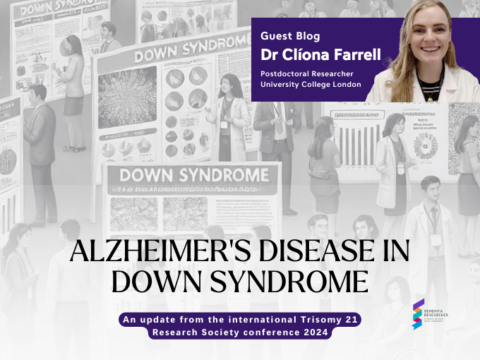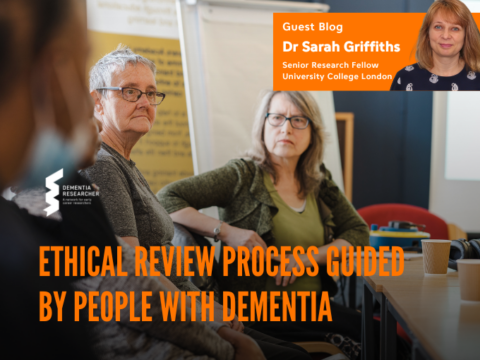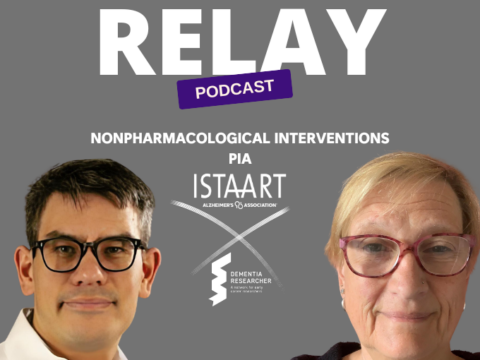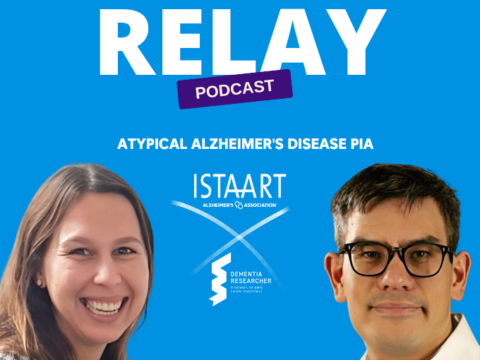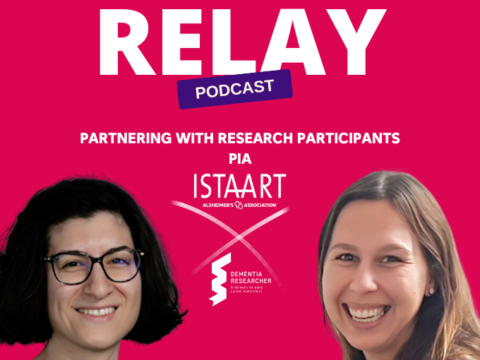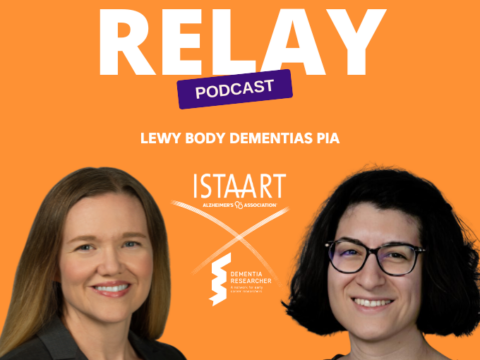This week’s podcast is hosted by former panellists Anna Volkmer, a Speech and Language Therapist Researcher from UCL, discussing a topic that she is particularly passionate about; consenting participants into dementia research. She is joined by Dr Clarissa Giebel, Dr Aida Suarez-Gonzalez and James Fletcher all who have first-hand experience of consenting adults into dementia research trials and studies and share their experiences and tips.
Discover how each of the panellists navigate the ‘grey area’ of capacity, hear a remarkable story of bravery from one person who took part in dementia research and how we could all benefit from taking the time to produce inclusive documents that are not too long and jargon-filled.
The panel discuss their experiences within the context of adhering to the English and Welsh mental capacity act of 2005.
The useful website Dr Aida Suarez-Gonzalez mentions can be found her here: https://www.changepeople.org/
The resources developed by Jill Pearl and Speakability can be found in their new home on the Collaboration of Aphasia Trialists (CAT).
Voice Over:
Welcome to the Dementia Researcher Podcast, brought to you by dementiaresearcher.nihr.ac.uk, a network for early career researchers.
Anna Volkmer:
Hello, my name is Anna Volkmer and I am delighted to be hosting this podcast today for the NIHR Dementia Researcher website. I’m a speech and language therapist by background, and I’ve just almost finished a PhD doing research with people with language led dementia, and I am also particularly interested in decision making, mental capacity, and consent, both in the clinical sense and the research sense. This week, we’re actually going to discuss consent. Now the English and Welsh Mental Capacity Act of 2005 provides guidance on the process of gaining consent from potential research participants in these countries. It is not uncommon for consent forms for research studies on dementia to comprise really small compact jargon-laden text, it is really difficult for people to follow, and it can make it really difficult to ensure that individuals with dementia are actually able to access information and make an informed decision about participating in research. And participants have often said to me that they’re actually signing consent forms based on the fact that they trust the professionals, or the researchers, that they’re actually working with, rather than that, they necessarily understand all the content, but are things changing?
So today, I’ve been joined by three early career researchers who’ve gained a massive amount of experience in consenting people to participate in their studies, both those who do, and those who don’t actually have capacity to do this for themselves. I’d like to introduce Dr. Clarissa Giebel, Dr. Aida Suarez Gonzalez and James Fletcher. All of you, the first question, could I perhaps ask you to all introduce yourselves, and perhaps share a little about your own research?
Dr Clarissa Giebel:
Yeah. Hi, my name is Clarissa Giebel. I’m a dementia care researcher at the University of Liverpool and the NIHR ARC North West Coast. My background is neuro-psychology, but at the moment I focus a lot on health inequalities in people living with dementia, and trying to find out if there are any barriers or facilitators that help or hinder people stay at home for as long as possible. Some aspects I look at are rural versus urban living, or deprivation, which is very high in the Northwest coast of England, or ethnicity and gender. Just in a nutshell.
Anna Volkmer:
Great. Thank you, Clarissa. Aida?
Dr Aida Gonzalez:
I’m Aida Suarez Gonzalez, I’m a clinical neuropsychologist. I trained in Spain and now I work as a clinical scientist in the Dementia Research Centre here at UCL. And my research is focused on developing assistive technologies and interventions to support people living better with dementia. And I mainly focus on people affected by atypical forms of Alzheimer’s disease and frontotemporal dementia.
Anna Volkmer:
Fantastic, thank you. And James?
James Fletcher:
Yep. I’m James Fletcher. I’m a teaching fellow King’s College London. My main research looks at role negotiation in informal dementia care networks. But I also do a bit of work on the Mental Capacity Act, and it’s an issue that really interests me.
Anna Volkmer:
Fantastic. We’ve got three very well informed people to chat with us today and all of whom I’ve met before, so this is going to go swimmingly. We’re all going to be able to chat loads. So James, let’s start with you. How would you actually explain consent in dementia research? So what it is, why do we do it, just in case anybody doesn’t actually know it. And perhaps bearing in mind that some of our listeners are actually from overseas and not from the English and Welsh constituencies that are covered by this mental capacity legislation that we are.
James Fletcher:
I think consent in itself is quite a simple concept, in terms of how we ensure that somebody is willing or happy to participate in a research project, and they’re not being made to. The issue really with consent is informed consent. So we qualify that as informed consent, which raises questions about you, how you adequately inform somebody about a research project before they become involved in that, especially if that person has a cognitive impairment and therefore, potential difficulties processing information. And so that’s where the difficulties really arise in relation to dementia research, specifically, and then there are various ways that we go about doing that, typically through information sheets
Anna Volkmer:
And written information sheet.
James Fletcher:
Yeah, written information sheets. As you said, these can often be quite complicated, but often in dementia research we use what is sometimes called easy read sheets. So they’re simplified information sheets, stripped down to the bare basics, with large, fun, accessible text, these sorts of things, to try and convey as much information as possible without overburdening potential participants.
Anna Volkmer:
Thank you, that’s really helpful. So I thought I’d throw the floor open a little bit now and just ask everybody to tell us a bit about their experiences of actually gaining consent in dementia research, and perhaps invite people to share some specific examples of what they’ve done.
Dr Clarissa Giebel:
I’ve worked in dementia research for about eight years now, I think, or maybe a bit more. I think only in the past few years, I’ve kind of gotten my head around it and felt much more comfortable in taking informed consent and assessing mental capacity. Just because there are sometimes almost like a grey line where you don’t really know, does this person have mental capacity or not? So one of the things I’ve learned throughout the years, is whenever I feel the slightest feeling of I’m not too sure, maybe this person doesn’t have mental capacity, I’d rather then get the consultee to sign a consent form, not on behalf of the person with dementia, but to provide informed consent for the person with dementia, with their best interest in mind. One example, I’ve had recently, so I’m doing a bit of care home research at the moment in the Northwest coast. We’re doing a lot of focus groups with residents.
And obviously, people that live in care homes they’re often, if they do have dementia, they’re quite advanced anyways. So, your kind of always have to think, “Oh, they might lack the capacity.” What was interesting was that care home staff, it was actually a really nice care home, so care home staff brought in all these residents saying, “Yes, they have capacity to consent. Yes, yes, yes.” So I assessed capacity in a lot of those residents, and none of them had mental capacity according to the research standards.
Anna Volkmer:
Okay.
Dr Clarissa Giebel:
Which makes me think, are there different expectations to capacity in people that directly work with them on a day to day basis, as opposed to research. I’d rather stay on the safe site with research.
Anna Volkmer:
And I guess it’s worth saying that here, that when we talk about the capacity to consent or to make a decision, in England and Wales that means the Mental Capacity Act has defined the ability to make a decision as being able to understand, retain, weigh up, and express a decision. And that’s not the same across, for example, in Scotland and Northern Ireland have slightly different nuances. Well, in Northern Ireland, actually their mental capacity bill hasn’t actually been passed, and isn’t in practice yet, but certainly in Scotland, there are some different nuances to that definition. But it’s interesting that you would say that perhaps different professionals have different def… I was going to say definitions, but it’s not right because mental capacity is the definition, that the act is the definition, perhaps different levels. It’s really interesting, and a bit worrying.
Dr Clarissa Giebel:
A bit. I mean, if it’s just about, if you just ask a resident, would you like a hot drink, or would you like to watch some television, and they say yes or no, and you kind of interpret that, that’s different. But then it makes me think of all the other activities that care home staff have to do. And what if then the residents don’t actually want that done, but the care home staff interprets that as, “Yes, I give my” [crosstalk 00:09:09].
Anna Volkmer:
Yeah, that’s a really interesting question. Also, it might be more about them not understanding the research because it’s decision specific, isn’t it as well. It’s a really interesting point though, thank you. How about you, Aida? Would you like to share some examples.
Dr Aida Gonzalez:
And actually somehow related to your experience. I’ve been taking consent for 15 years now. I worked for many years in a dementia unit in a hospital in Spain. And I remember this, yeah, I have this memory of this man who was a participant in one of our studies, and I was still a junior clinician. And this person asked to be re consented every time that he came for the research visit, because he could not remember very well what has been going on in between visits.
Anna Volkmer:
He asked that?
Dr Aida Gonzalez:
He asked, yeah. He asked if every single time that he came for a research visit, he could be explained everything in the project, and we could make sure that he still agreed with what he had signed. This was completely new, I have never bumped into a situation like that before, but I saw how the team and the PI managed the situation. So the doctor that was in charge of the study, he was very accommodating and he had the conversation with this person, and of course, we agreed that this was the way we were going to do it with him. And the whole team worked together to make it easy for everyone, and that’s how we did it.
Anna Volkmer:
Yeah.
Dr Aida Gonzalez:
And that was a turning point for me because the determination of this man trying to retain his autonomy and also making this effort for explaining that his self-determination was important and being brave enough to ask these because this research environment in a hospital, they can be intimidating. And he did this and also the reaction of the PI and the doctors, that were so understanding, and flexible, and respectful, that that was a turning point for me because it added a different dimension to my understanding of the consent process. And I understood that it wasn’t only about a legal ethical requirement, [inaudible 00:11:45] it could be a human relationship and it could be flexible. And you could be actually supporting people with cognitive difficulties to remain in power, and to remain autonomous.
Anna Volkmer:
Yes, absolutely.
Dr Aida Gonzalez:
So that was an experience that really changed the way I look at consent.
Anna Volkmer:
I really liked you used the word empowered. I believe that too and I think that’s a lovely example. Too often I hear professionals saying, “Well, if they didn’t retain it from last week, maybe we should be reconsidering whether they have capacity,” but actually, the legislation says you just need to be able to retain the information in order to make a decision. And that that means not from week to week to week.
Dr Aida Gonzalez:
And he did retain at the moment and he did understand. And actually, his decision remained constant right until the end of the study, so he was deciding the same. And he was able to remember some generalities about his previous visit, but he felt he was really trying to feel and to understand who he was with his Alzheimer’s.
Anna Volkmer:
Good for him.
Dr Aida Gonzalez:
And he was trying to find his new identity and retain his previous identity. And he was doing it through these kinds of actions. And I think he gave, it was like a gift for all of us, and he made a massive contribution to our sensitivity.
Anna Volkmer:
Yeah. That’s very a moving story, wow. James, hard act to follow.
James Fletcher:
I’m relatively new to assessing capacity, so I’ve been doing it for four years. But my first one always sticks with me because it was a man who again, was really borderline. And it struck me on the drive home. I mean, obviously when you do your first capacity assessment, you’re already sort of hyper-thinking everything.
Anna Volkmer:
Yeah.
James Fletcher:
But it really struck me that a group of researchers, say we have a hundred researchers assessing capacity, 50% are saying, yes, capacity, 50% of saying no, no capacity. So it hits you, there’s always this sort of subjectivity and a little bit of ambiguity to capacity, because however much you try to define capacity, it’s not rigidly defined. For example, you can’t use cognitive batteries to magic capacity, which I find really interesting that that’s not the case, but there were really good reasons for that because it means that decisions are situational.
Anna Volkmer:
And also that, because they can’t agree in the research literature, what the kind of core cognitive skills are that comprise decision-making.
James Fletcher:
Yeah.
Anna Volkmer:
So it’s really tricky to then designer a formal assessment around that. But I liked the fact that you are talking about this grey zone. I find that the conversations I have about capacity assessments are often about the ones where you’re not sure, whereas the ones who clearly do have capacity, and the people who clearly don’t have capacity, that probably forms 90% of most people’s, and I guess I’m coming from a clinical background, 90% of most people’s clinical work. But it’s the ones where you’re not quite sure that are the ones that really worry people and can be really, really difficult too.
James Fletcher:
Yeah, and I think it’s because I conduct research with people who still live in their own homes, supported quite a lot, in many cases. But they do tend to be around that area so it is often hard to decide. And I think that that was quite unnerving at first, in terms of who am I to cast these seemingly arbitrary judgements over people, because it is serious. You are deciding someone’s status in the eyes of the law. It is a legal capacity. But the more I looked into it, I’ve found that you have these two, you have the human rights approach where legal rights are inalienable. So because you’re a person, you have legal rights and they can never ever be challenged, and then you have capacity approaches. And most countries in some form take a capacity stance, whereby it is deemed that a certain level of cognitive impairment means that you don’t have legal capacity to make certain decisions. And I think in the balance of things, that’s probably a better approach in terms of safeguarding. And it’s massively problematic in many respects.
Anna Volkmer:
I’m just smiling.
James Fletcher:
But it’s better than a sort of free for all system.
Anna Volkmer:
It’s a very tricky thing I think, to get it completely right for everybody. You’re right. And I think you’re right, it’s about safeguarding as well as empowering, isn’t it?
James Fletcher:
Yeah.
Anna Volkmer:
And we’re already starting to get onto problems, and I’m really interested that, Clarissa, your example, your experience was you already reflecting on some of the problems of gaining consent. So I just wondered if you could tell us a bit more about the problems you’ve experienced, both in gaining consent itself, and in the practices of gaining consent.
Dr Clarissa Giebel:
That was one example, with the care homes.
Anna Volkmer:
Good one, yeah.
Dr Clarissa Giebel:
Problems in terms of gaining consent. Most of my research is really in the home environment of the person living with dementia. Often they have a family carer. One of the things that is an example as well, that sticks with me on an emotional level as well is a gentleman who had semantic dementia. Now, his wife was there as well, it was a couple of years ago when I did this study so I went there to do some cognitive testing that was part of the study, but taking the informed consent was a big hurdle in itself. He still had the cognitive faculties as to think, but he just couldn’t transmit it via his language, which was quite upsetting as well. In the end, we decided that it was best if the wife signed as a consultee, basically.
But it stuck with me because he could still, when I gave him certain tasks of the ACE-III or other neuro-psychological batteries, he was acing them, but he just couldn’t do the language bits. That’s one example of a difficulty assessing capacity as well, I suppose, because he couldn’t relay back to me that he understood what the study is about because of his verbal limitations, speech limitations. That’s another example.
Anna Volkmer:
Yeah, it can be very difficult if somebody has a communication difficulty, and putting in all the appropriate supports can be difficult if you don’t have skills in speech and language and communication. I hear that time and time again, that people aren’t sure which strategies might work best for somebody or which strategies are actually available, or you’re not trained in various different communication strategies. Absolutely. Aida, have you undertaken or seen any good examples? Any examples of innovative practice in this area at all?
Dr Aida Gonzalez:
Yes. They are not common, I must say, but when I’ve seen them, all of the good examples that I’ve witnessed, they have two characteristics. One is, and this is pretty amazing, when the research team understands that taking consent is a part of a person centre care framework. And this is very important because when the process becomes dynamic in which their previous experiences of the participants are taking into account, and the motivations, and the emotions, and the family comes on board, and their input is valued, so communication becomes much more easy. And the other element is when the research team commits, really commits, to cognitive accessibility. And this is actually something that everybody in theory understands, but very few people put into practice [inaudible 00:20:10]. And I think that when you really want to operate under the principles of cognitive accessibility and produce a real accessible environment, not only the documents, you really need to spend time planning.
For instance, is not only about making easy read documents, because sometimes there are some studies that are so complicated that the length of the information is a barrier in itself. You need to spend time thinking about this study, meeting with the team, and trying to summarise the most and highlight the most relevant points. All this takes time. And the other element is that sometimes when you want, really, to conduct and take consent in a way that is respectful with the principles of cognitive accessibility, sometimes you need to move away from some standards. For instance, you need to explain concepts and procedures using experiences.
Anna Volkmer:
Yes.
Dr Aida Gonzalez:
Like maybe taking, I remember in the past, I remember a patient of mine, with semantic dementia and she was a pharmacist, and she didn’t remember anymore what MRI scan was so I took her to the machine.
Anna Volkmer:
Yeah.
Dr Aida Gonzalez:
And I show her around. And I explained, because she could not understand the concept if she didn’t have the direct experience. And there are many ways in which we can do these, we can also use videos, and we can build small stories with a participant going through the different research tests. They go into this testing and the blood, and then MRI, scan, or the training, or whatever. And there are free tools in the internet that can help us do all of this. So when I’ve seen in practice, these two principles, the person centered approach and the commitment with cognitive accessibility, for me, it’s been like the ideal way of taking consent, really.
Anna Volkmer:
I recently saw some co-produced video participant information distributed for a research study and it was wonderful. It was co-produced as well.
Dr Aida Gonzalez:
Exactly.
Anna Volkmer:
And it was so particularly powerful in my mind. I mean, have you guys had much experience or seen any co-produced consent forms?
Dr Clarissa Giebel:
No.
Anna Volkmer:
No, you haven’t?
Dr Aida Gonzalez:
Yeah, I have.
Anna Volkmer:
You have.
James Fletcher:
I spoke about this on this podcast once though, the bad experience that I had with an ethics committee where I produced an easy read information sheet with people with cognitive impairment, but the committee didn’t like it. And obviously, the committee win-
Anna Volkmer:
Really?
James Fletcher:
In that situation, because you have to satisfy your committee rather than the people.
Anna Volkmer:
Yeah, yeah, yeah.
James Fletcher:
That was sort of an awkward situation.
Anna Volkmer:
That’s so interesting because I’ve had the opposite experience, where I produced an accessible… So in speech and language therapy, we use the word inclusive communication rather than easy read or accessible, inclusive communication. And we produce those with people with primary progressive aphasia. And when the ethics committee asked me what I’d produced, and I was able to explain that I co-produced these, and they were so delighted with them. And they also then said, “Well, where are the ones for the carers without dementia?” And I explained that I was using the inclusive ones because they include both people with communication difficulties and without, they were absolutely delighted. So it’s quite interesting because there’s obviously that, the ethics committees have their own opinions too.
James Fletcher:
And I think my case is where I’ve, haven’t spoken to other people, I was surprised by that. And I think that’s not the norm. Yeah. Yeah.
Anna Volkmer:
I would hope so. Hope so. And so I just wondered whether you guys felt that most people, even without dementia, I mean, I’ve kind of already touched on this by talking about inclusive communication being appropriate for both people with communication difficulties, with dementia and without. But do you find that most people, even without dementia find reading jargon-filled consent forms, difficult?
Dr Aida Gonzalez:
I do.
Anna Volkmer:
Everyone’s giggling slightly.
Dr Clarissa Giebel:
Yes. But I make it practice to kind of always go through these jargon-filled information sheets and consent forms. One thing I also have, so I do a lot of a postal questionnaire. They are being handed out by clinicians, for example, to family carers. They take them with them, they’ve got a free post return envelope and alongside the questionnaire, they return the consent for that.
Anna Volkmer:
Yep.
Dr Clarissa Giebel:
But as opposed to signing their initials in the box, I get about 50% back where I just get a tick so that’s a bit of an issue, a barrier. But yeah, when I go face to face and do tests or interviews, then I kind of make it practice to just talk through the study anyways, to avoid any potential misunderstandings.
Anna Volkmer:
I think I’ve done that myself, like signing my mortgage, not tick the right box and then have it sent back to me because I can actually read the fine print.
James Fletcher:
Yeah. We’ve all done it with the T&Cs.
Anna Volkmer:
Indeed.
James Fletcher:
Interestingly, in my doctoral research, I had the standard information sheet and the short information sheet. And because I didn’t want to be patronizing to people, I offered everyone the choice.
Anna Volkmer:
That’s a nice idea.
James Fletcher:
Thinking that, “Okay, I wouldn’t want to be patronising to people who had more advanced dementias, they may still want to read the long one. What actually happened is inevitably everybody went for the short one.
Anna Volkmer:
Yeah.
James Fletcher:
Even those who you would say, “Okay, they don’t need a short information sheet.” Everybody did. And I think in that situation, I’d be the same. If you offer me a long one and a short one, I’ll pick the short one.
Anna Volkmer:
Yeah. Nobody enjoys reading long pieces of text filled paper, unless you’re an academic, and a researcher.
Dr Aida Gonzalez:
[inaudible 00:26:34].Anna Volkmer:
I think we can probably agree that even people without dementia benefit from accessible or inclusive information, as well as those with. I’m mindful of the time. And I just wondered whether there were any tools that you may find useful, have found useful, that you’d like to share. I think we’ve already started alluding to some, but I wondered if there are any specific ones that you’d like to mention.
Dr Aida Gonzalez:
I really like a guide to build [inaudible 00:27:08] read material and accessible material, which is a guide produced by changepeople.org.
Anna Volkmer:
Okay.
Dr Aida Gonzalez:
And it is my favourite because it leads by example. It is a cognitively accessible guide, itself, explaining how to produce cognitively accessible material. And it explains how to produce your documents, how to include the pictures, many examples, and also a checklist at the end. So when you are working on your document, you can check if you are following all the recommendations. And I really like it, I think it is very friendly and very… Yeah.
Anna Volkmer:
Does anybody else have anything?
Dr Clarissa Giebel:
No, this is great. I’m learning here as well.
James Fletcher:
I’m going to look that up now.
Anna Volkmer:
Yeah. Well, there’s one I think I’ve mentioned to you Aida, before actually, produced by a speech and language therapist called Jill Pearl who works with third sector organisation, Speakability. And she developed a resource for people with non-progressive aphasia, with the NIHR. And it’s actually designed around consent. So it’s got lots and lots and lots of images that have been co-produced with people, with communication difficulties in their families. And you can cut and paste them into your consent forms, and it covers loads and loads of domains, that are often really, really hard to present or represent in pictorial formats, it’s really neat. So yeah, I’d definitely recommend that.
Dr Aida Gonzalez:
Actually, I use it a lot, since you show it to me.
Anna Volkmer:
Great, yes. We’re changing the world, one picture at a time. So it is actually time sadly to end today’s podcast recording. And I’d like to thank each of our panellists, Clarissa, Aida and James. But I just wondered if there are any final points before we go that you’d like to make. Any top tips for any early career researchers who might be struggling with this topic.
Dr Clarissa Giebel:
I would recommend to shadow or go along with someone who’s done it a lot and is currently collecting data and assessing mental capacity, to shadow that person for a bit. And then afterwards, also have a chat about, “Oh, what made you then decide that this person has capacity or not?” To just kind of learn a bit, I think it’s just learning by experience as well.
Anna Volkmer:
Yeah, that’s nice.
Dr Aida Gonzalez:
And formal training people should feel like… Sometimes it seems that people feel a bit scared of admitting that they don’t know how to do it or that they need training, and training is a great thing. You are acquiring skills and education, and there are lots of resources out there, and a lot of webinars. And the NHS has a lot of resources and documents that you can use. And also not being scared of saying, “I don’t know how to do it,” and seek for help because we all started from scratch. And then we develop skills over time, but you need to get advice from others and you need to educate yourself, and you need to be exposed to good examples.
Anna Volkmer:
Yeah, good point.
James Fletcher:
Yeah. I think shadowing, if possible, is great advice. And also, just to remember that the capacity isn’t this set in stone term, there are some people who are in a grey area. And so if you’re uncertain, that’s not necessarily a comment on you, that may be a comment on the reality of the situation.
Anna Volkmer:
Indeed. And I think I could keep talking about this topic forever. I’m really interested in mental capacity, decision-making and consent. And I often tell people to actually go and read the Mental Capacity Act, it’s not that difficult. Or things like there’s guidelines, the NICE have produced a guideline on decision making and mental capacity. For my sins, I was a member of the committee who wrote that guideline. And the first recommendation is around training. And that any organisation you work for is responsible for training you in this area, so I’m really glad that you guys have all bought up different kinds of versions of training, shadowing, mentoring, formal training. If you do, any of the listeners, have anything else to add on this topic, please do post your comments against this podcast, or on our website. And drop us a line on Twitter using #ECRdementia. We have profiles on all of today’s panellists on our websites, and I think most of the panellists also have Twitter profiles. Maybe you guys could shout out your profile names .
Dr Clarissa Giebel:
Yeah, mine is @clarissagiebel.
Dr Aida Gonzalez:
I’m @aidasuarez.
James Fletcher:
And I’m @jamesrufletcher. That’s R-U.
Anna Volkmer:
Great, and I’m @Volkmer_Anna. There will also be a transcript of this podcast, please do tell any colleagues who may not be able to listen. And finally, please remember to subscribe and leave a review on this podcast through iTunes, Spotify, and SoundCloud. And please tell your friends and colleagues. Thank you very much.
Voice Over:
This was a podcast brought to you by Dementia Researcher, everything you need in one place. Register today at dementiaresearcher.nihr.ac.uk.
END
Like what you hear? Please review, like, and share our podcast – and don’t forget to subscribe to ensure you never miss an episode.
If you would like to share your own experiences or discuss your research in a blog or on a podcast, drop us a line to adam.smith@nihr.ac.uk or find us on twitter @dem_researcher
You can find our podcast on iTunes, SoundCloud and Spotify (and most podcast apps).

 Print This Post
Print This Post